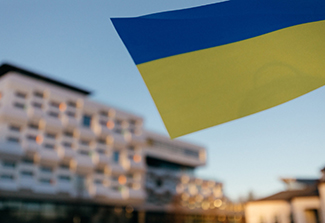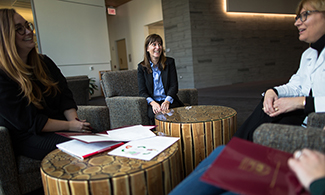Bioethics program perseveres in wartime Ukraine
July/August 2023 | Volume 22 Number 4
 Photo courtesy of Ukrainian Catholic UniversityUkrainian Catholic University, pictured, in partnership with Loyola University Chicago, provides doctoral and post-doctoral bioethics training to Ukrainian fellows. Despite the ongoing conflict, the program has grown.
Photo courtesy of Ukrainian Catholic UniversityUkrainian Catholic University, pictured, in partnership with Loyola University Chicago, provides doctoral and post-doctoral bioethics training to Ukrainian fellows. Despite the ongoing conflict, the program has grown.
In 2017, Dr. Emily Anderson, a bioethics professor at Loyola University Chicago, visited Ukrainian Catholic University (UCU) for the first time. She was invited to speak at their School of Bioethics which at the time offered short certification programs but no formal degrees.
After returning to Ukraine to teach several times, Anderson got a sense of what the bioethics community needed. She began working on a partnership to provide master’s and doctoral-level degrees for students at UCU, to build capacity in the region.
But just as they received funding COVID-19 began to spread in Europe, forcing Anderson to manage the program and work with trainees from halfway across the globe. Now in 2023, the ongoing conflict in Ukraine has further isolated trainees from their studies over the last year and a half. Despite these devastating setbacks, the program has grown and currently has 10 trainees, four of whom joined in 2023.
The program primarily consists of women, with only two male trainees, reflecting the predominance of women in the health professions in Eastern Europe. Tragically, one of these trainees, Dr. Maksym Basarab, who wrote
Oncology, Bioethics, and War for the Hastings Center Forum, died of a stroke in 2022. He had stayed in Dnipro to continue to treat his patients, after sending his wife and daughter to safety in Poland.
The Loyola-Ukrainian Catholic University Bioethics Research Training Program (LUC-UCU) provides advanced training through doctoral and post-doctoral fellowships in research ethics to scholars and professionals from Ukraine. Fellows spend about one to five years completing online coursework in Loyola’s doctoral bioethics program while living in Ukraine.
Dr. Yaryna Pikulytska is a pediatrician and project manager at the School of Bioethics at UCU who started in the program in January 2022. She recently opened a new location of the outpatient clinic called "Vulyk" in Lviv, Ukraine.
 Photo courtesy Loyola University/Lukas Keapproth
Dr. Emily Anderson (middle), talks with fellow faculty and students at Loyola University Chicago. Bioethics fellows complete coursework in Loyola’s online doctoral bioethics program while living in Ukraine. They also participate in monthly webinars on academic success, professional development, and responsible conduct of research and engage in collaborative scholarship with their mentors while contributing to bioethics-related activities at UCU. Opportunities to meet in person have been limited due to both the pandemic and the war.
Photo courtesy Loyola University/Lukas Keapproth
Dr. Emily Anderson (middle), talks with fellow faculty and students at Loyola University Chicago. Bioethics fellows complete coursework in Loyola’s online doctoral bioethics program while living in Ukraine. They also participate in monthly webinars on academic success, professional development, and responsible conduct of research and engage in collaborative scholarship with their mentors while contributing to bioethics-related activities at UCU. Opportunities to meet in person have been limited due to both the pandemic and the war.The hope is that the competencies gained through this fellowship will allow trainees to hold leadership positions at their institutions and teach bioethics, lead ethical reviews of research, and provide consultation on ethical issues to biomedical as well as behavioral and social science researchers.
Working in western Ukraine where many of the trainees have relocated to, she had been mostly unaffected by the strikes from Russian forces. However, on the morning of her interview with Fogarty, there was an air strike in Lviv. In spite of this, she still decided to go through with our interview, which speaks to the perseverance of the trainees in this program.
Pikulytska says that even with the chaos outside, she couldn’t imagine giving up on this program. “This program has given me a connection to a normal life without war, to normal people who are living without missile attacks.” She also says, “It’s allowed us to share our experience and communicate with other students in the program and raise difficult questions about wartime health care ethics.”
Anderson credits the resilience and determination of her trainees, exemplified by Pikulytska, along with Fogarty’s support for keeping the program afloat and growing despite the ongoing war. “Subconsciously, when I’m looking for master’s and doctoral level students, I’m looking for some indication of grit, and this group of trainees has shown me that no one is grittier than the Ukrainian people.”
While the war in Ukraine makes planning for the future of the program difficult, Anderson believes that research will be a huge part of the rebuilding process in Ukraine, and they need to be prepared. She says, “Rebuilding the research infrastructure will be an important step for Ukraine following the war, and having educated scholars who understand the ethical issues around research will be critical.”
More Information
Updated August 10, 2023
To view Adobe PDF files,
download current, free accessible plug-ins from Adobe's website.
Related Fogarty Programs
Related World Regions / Countries
Related Global Health Research Topics